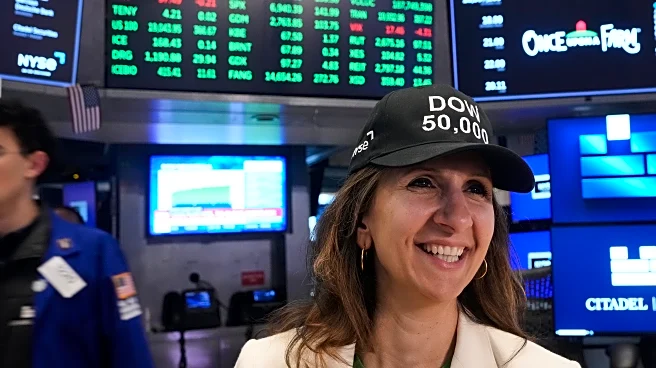What's Happening?
The fictional rock band Spinal Tap, known for its comedic portrayal in the 1984 mockumentary 'This Is Spinal Tap,' has reunited for a sequel titled 'Spinal Tap II.' Directed by Rob Reiner, the film features original cast members Michael McKean, Christopher Guest, and Harry Shearer reprising their roles. The sequel explores the band's reunion for a final stadium show in New Orleans due to a contractual obligation. Despite the passage of time, the band members, now older, engage in humorous interactions and musical performances, maintaining the comedic spirit of the original film. The movie includes appearances by real-life rock legends such as Paul McCartney and Elton John, adding to its nostalgic appeal.
Why It's Important?
The release of 'Spinal Tap II' highlights the enduring popularity of the original film, which has become a cult classic over the years. The sequel taps into the nostalgia of fans who grew up with the original, while also introducing the comedic style to a new generation. The film's ability to attract participation from renowned musicians underscores its cultural significance and the impact of the original mockumentary on the music and film industries. By revisiting the characters and themes, the sequel offers a reflection on the evolution of rock music and its associated stereotypes, providing both entertainment and commentary.
What's Next?
With the release of 'Spinal Tap II,' fans can expect renewed interest in the original film and its music. The sequel may lead to further exploration of the mockumentary genre, potentially inspiring new projects that blend comedy with music. The involvement of high-profile musicians could also spark collaborations or tributes within the industry. As the film gains traction, discussions around its comedic approach to rock culture and its influence on subsequent media may emerge, contributing to its legacy.
Beyond the Headlines
The film's portrayal of aging rock stars and their struggles with relevance touches on broader themes of identity and legacy in the entertainment industry. It raises questions about the pressures faced by artists to maintain their status and adapt to changing cultural landscapes. Additionally, the comedic depiction of rock stereotypes invites reflection on the genre's evolution and the role of parody in challenging established norms.










